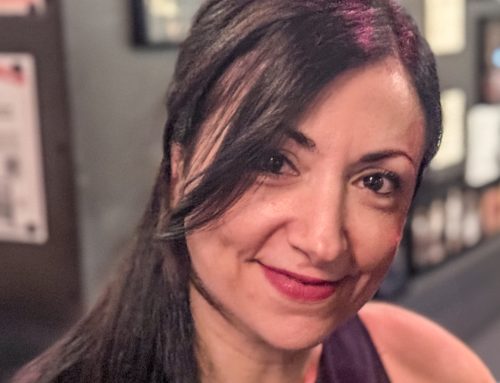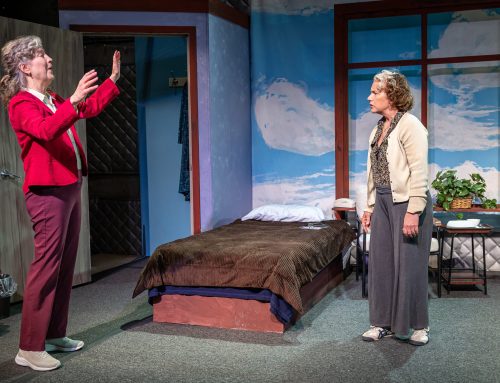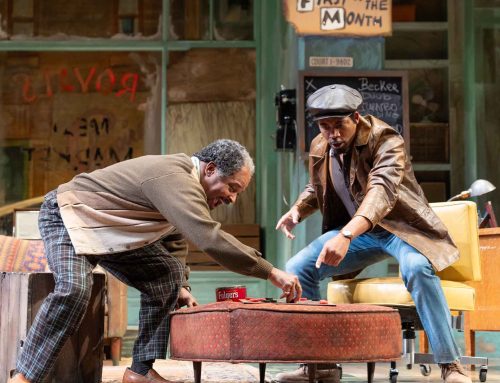at the Oregon Shakespeare Festival

Two days later Willful is still coming up in meal conversations and rides in the car. We’re still sharing insights of what we experienced and delighting over twists and conceits that worked for us. Or, maybe that one didn’t even exist except in our own mind.
When you appear for the show, the audience is divvied up and each group of 20 or so starts in a different physical location near Oregon Shakespeare Festival’s Elizabethan Theater. Each group sees 10 minutes of a different story, and then all the groups gather in the Lizzy for another chunk of the experience. Even in the theater only a part of the interaction is shared to the whole group. Much of what you hear is from a performer talking to the 8 of you clustered in neighboring seats.
The audience exits the Elizabethan and is split up, visits one of two more venues, and reforms in the Black Swan where the character and action treads come together… mostly… kind of… maybe.
Willful uses the sounds, temperature, smells, and especially views of the different venues. The spaces and their feel are a part of the show much more than the fact of a large outdoor stage instead of a small theater-in-the-round impact the staging of a traditional Shakespeare play.
The stories’ emotions and refracted character longings and traits are powerful, in some ways universal and natural. You strain to catch them and to grasp a unified meaning from the composite show. You join the seeking of the characters, and try to make meaning of what you’re experiencing.
It’s just too weird. But, wait. Maybe not. Oh, those parts fit together! I feel that.
In the end, we were amazed, not sure what hit us, and happy to talk about it.
This spark of non-standard theater is difficult to write about in a linear way. The cast was uniformly superb, underplaying, and taut. Even their choreographed moments were sharply in sync.
But, how to talk about the performers and their characters? The characters have no names or identifiers, and in our post-performance discussions we found ourselves talking about “when Dee did this” or “when Judith-Marie Bergan was in the Elizabethan.” Because this is OSF and we know the actors, we used the real persons’ names to identify on-stage characters. We cheated to satisfy our own need to make things clearer and more orderly.
And, Dee Maaske is magnificent, controlled, and full. So, too were the actors playing the twins, the son, the father, the missing boyfriend. But, wait, some of those labels refer to the same person. As good as they are, I don’t want to single out Richard Elmore, Mark Bedard, or John Tufts. I don’t want to tell you too much.
Similarly, I can cite the impact of the observational tree spirits, Catherine Coulson, Judith-Marie Bergan, and Richard Howard. But, I don’t want to explain or dwell on them. They were great, sparse brief roles. Witty and wise (even if I doubt that anyone seeing them would have called them “tree spirits”, the term we heard from a friend who had been told by one of the trio what part they had been hired for.)
Willful grew from a workshop. There are some workshoppy movement moments. Yet, instead of making me snicker at the artiness of it all, I liked unison movements and studio moments.
Willful is magical but dense, full of yearning and searching. Connected stands of isolated performances and story lines blend on the paths.
My inner cynic says I should be complaining the Willful is too ethereal and pompous. Except it got to me.
Ozdachs Rating: 





I saw it on opening day and hated it. The others in my party sort of liked it.
The whole scene of the gods (??) in the Elizabethan and the following videos just struck me as pompous and silly.
Well, yes, it is not served up the same way as other show. You have to struggle. I guess I like struggling.
Not gods. No, no, no. Struggle some more.
Willful Works the Second Time
We saw Willful again this afternoon. While we were looking forward to a second performance, I was somewhat apprehensive that the impact would fall apart since I knew more and we’d talked extensively about the show. If anything, seeing the program a second time was better.
The new pieces of the story we saw today absolutely fit with what we’d seen before. All of the comments blended well, we’re still up for talking more about the people and scenes.
For the record, today we started with Miriam by the parking garage.
Still very much 5 stars!
Hmmmmm
Well, evidently we saw a different play as well. A long time theater lover and OSF audience member, I LOVED the play. My nose wrinkled a bit too when I heard that it was set in 1840s Northern California. . . . Oh dear I thought. . . another one. And yet, in performance, the setting worked entirely, supporting both the message and the language of the play. I found it emotionally engaging, lively and generally, all aorund wonderful.
It feels important to note that I am a 59 year old theater goer. I’ve seen any number of R and J productions in my time.
While I agree with a few of your criticisms (the erratic accents, the unecessary and confusing elevation of the role of apothacary) overall I found Williamson’s interpretation
And Romeo can so “snivel” as you call it. He is a TEENAGER in the play. . .about 16 I think.. ..have you ever seen how deeply a 16 year old feels something? I thought Molna perfectly captured the passion, innocence and vulnerability of that age. I LOVED his performance, perhaps the most. He touched me repeatedly, calling to mind those innocent moments of MY own youth, where even a moment out of the presence of my beloved was UNENDURABLE! Juliet was wonderful as well. I feel the language of the play completely supports this representation of young love.
Please spare me from another Romeo speaking in practiced imabic pentamiter. Or another nurse so broad as to not be believed. .. .or aother Lord and Lady Capulet who represent the roles correctly while at the same t ime. .. exaactly .WHY do they do as they do?
I found this year’s production of Romeo and Juliet clear (as is the hallmark of Shakespear at OSF. . . after all it is THEATER, not just literature) and compelling with rich, nuanced performances and a surprising concept that carried the message of the play to my heart in new and suprising ways.
Call me a sap, a cornball and not witty or clever enough to warrant my 59 years. I have always LOVED this play and was relieved and grateful o witness a product that I felt captured the heart, rather than the caricature of it.